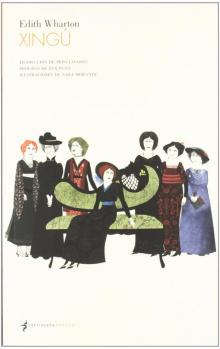- Home
- Edith Wharton
Madame De Treymes Page 2
Madame De Treymes Read online
Page 2
“Well, I was not when I was with your mother. She made everything seem easy and natural. She took me back into that clear American air where there are no obscurities, no mysteries—”
“What obscurities, what mysteries, are you afraid of?”
She looked about her with a faint shiver. “I am afraid of everything!” she said.
“That’s because you are alone; because you’ve no one to turn to. I’ll clear the air for you fast enough if you’ll let me.”
He looked forth defiantly, as if flinging his challenge at the great city which had come to typify the powers contending with him for her possession.
“You say that so easily! But you don’t know; none of you know.”
“Know what?”
“The difficulties—”
“I told you I was ready to take my share of the difficulties—and my share naturally includes yours. You know Americans are great hands at getting over difficulties.” He drew himself up confidently. “Just leave that to me—only tell me exactly what you’re afraid of.”
She paused again, and then said: “The divorce, to begin with—they will never consent to it.”
He noticed that she spoke as though the interests of the whole clan, rather than her husband’s individual claim, were to be considered; and the use of the plural pronoun shocked his free individualism like a glimpse of some dark feudal survival.
“But you are absolutely certain of your divorce! I’ve consulted—of course without mentioning names—”
She interrupted him, with a melancholy smile: “Ah, so have I. The divorce would be easy enough to get, if they ever let it come into the courts.”
“How on earth can they prevent that?”
“I don’t know; my never knowing how they will do things is one of the secrets of their power.”
“Their power? What power?” he broke in with irrepressible contempt. “Who are these bogeys whose machinations are going to arrest the course of justice in a—comparatively—civilized country? You’ve told me yourself that Monsieur de Malrive is the least likely to give you trouble; and the others are his uncle the abbe, his mother and sister. That kind of a syndicate doesn’t scare me much. A priest and two women contra mundum!”
She shook her head. “Not contra mundum, but with it, their whole world is behind them. It’s that mysterious solidarity that you can’t understand. One doesn’t know how far they may reach, or in how many directions. I have never known. They have always cropped up where I least expected them.”
Before this persistency of negation Durham’s buoyancy began to flag, but his determination grew the more fixed.
“Well, then, supposing them to possess these supernatural powers; do you think it’s to people of that kind that I’ll ever consent to give you up?”
She raised a half-smiling glance of protest. “Oh, they’re not wantonly wicked. They’ll leave me alone as long as—”
“As I do?” he interrupted. “Do you want me to leave you alone? Was that what you brought me here to tell me?”
The directness of the challenge seemed to gather up the scattered strands of her hesitation, and lifting her head she turned on him a look in which, but for its underlying shadow, he might have recovered the full free beam of Fanny Frisbee’s gaze.
“I don’t know why I brought you here,” she said gently, “except from the wish to prolong a little the illusion of being once more an American among Americans. Just now, sitting there with your mother and Katy and Nannie, the difficulties seemed to vanish; the problems grew as trivial to me as they are to you. And I wanted them to remain so a little longer; I wanted to put off going back to them. But it was of no use—they were waiting for me here. They are over there now in that house across the river.” She indicated the grey sky-line of the Faubourg, shining in the splintered radiance of the sunset beyond the long sweep of the quays. “They are a part of me—I belong to them. I must go back to them!” she sighed.
She rose slowly to her feet, as though her metaphor had expressed an actual fact and she felt herself bodily drawn from his side by the influences of which she spoke.
Durham had risen too. “Then I go back with you!” he exclaimed energetically; and as she paused, wavering a little under the shock of his resolve: “I don’t mean into your house—but into your life!” he said.
She suffered him, at any rate, to accompany her to the door of the house, and allowed their debate to prolong itself through the almost monastic quiet of the quarter which led thither. On the way, he succeeded in wresting from her the confession that, if it were possible to ascertain in advance that her husband’s family would not oppose her action, she might decide to apply for a divorce. Short of a positive assurance on this point, she made it clear that she would never move in the matter; there must be no scandal, no retentissement, nothing which her boy, necessarily brought up in the French tradition of scrupulously preserved appearances, could afterward regard as the faintest blur on his much-quartered escutcheon. But even this partial concession again raised fresh obstacles; for there seemed to be no one to whom she could entrust so delicate an investigation, and to apply directly to the Marquis de Malrive or his relatives appeared, in the light of her past experience, the last way of learning their intentions.
“But,” Durham objected, beginning to suspect a morbid fixity of idea in her perpetual attitude of distrust—“but surely you have told me that your husband’s sister—what is her name? Madame de Treymes?—was the most powerful member of the group, and that she has always been on your side.”
She hesitated. “Yes, Christiane has been on my side. She dislikes her brother. But it would not do to ask her.”
“But could no one else ask her? Who are her friends?”
“She has a great many; and some, of course, are mine. But in a case like this they would be all hers; they wouldn’t hesitate a moment between us.”
“Why should it be necessary to hesitate between you? Suppose Madame de Treymes sees the reasonableness of what you ask; suppose, at any rate, she sees the hopelessness of opposing you? Why should she make a mystery of your opinion?”
“It’s not that; it is that, if I went to her friends, I should never get her real opinion from them. At least I should never know if it is was her real opinion; and therefore I should be no farther advanced. Don’t you see?”
Durham struggled between the sentimental impulse to soothe her, and the practical instinct that it was a moment for unmitigated frankness.
“I’m not sure that I do; but if you can’t find out what Madame de Treymes thinks, I’ll see what I can do myself.”
“Oh—_you_!” broke from her in mingled terror and admiration; and pausing on her doorstep to lay her hand in his before she touched the bell, she added with a half-whimsical flash of regret: “Why didn’t this happen to Fanny Frisbee?”
III
Why had it not happened to Fanny Frisbee?
Durham put the question to himself as he walked back along the quays, in a state of inner commotion which left him, for once, insensible to the ordered beauty of his surroundings. Propinquity had not been lacking: he had known Miss Frisbee since his college days. In unsophisticated circles, one family is apt to quote another; and the Durham ladies had always quoted the Frisbees. The Frisbees were bold, experienced, enterprising: they had what the novelists of the day called “dash.” The beautiful Fanny was especially dashing; she had the showiest national attributes, tempered only by a native grace of softness, as the beam of her eyes was subdued by the length of their lashes. And yet young Durham, though not unsusceptible to such charms, had remained content to enjoy them from a safe distance of good fellowship. If he had been asked why, he could not have told; but the Durham of forty understood. It was because there were, with minor modifications, many other Fanny Frisbees; whereas never before, within his ken, had there been a Fanny de Malrive.
He had felt it in a flash, when, the autumn before, he had run across her one evening in the dining-room of the
Beaurivage at Ouchy; when, after a furtive exchange of glances, they had simultaneously arrived at recognition, followed by an eager pressure of hands, and a long evening of reminiscence on the starlit terrace. She was the same, but so mysteriously changed! And it was the mystery, the sense of unprobed depths of initiation, which drew him to her as her freshness had never drawn him. He had not hitherto attempted to define the nature of the change: it remained for his sister Nannie to do that when, on his return to the Rue de Rivoli, where the family were still sitting in conclave upon their recent visitor, Miss Durham summed up their groping comments in the phrase: “I never saw anything so French!”
Durham, understanding what his sister’s use of the epithet implied, recognized it instantly as the explanation of his own feelings. Yes, it was the finish, the modelling, which Madame de Malrive’s experience had given her that set her apart from the fresh uncomplicated personalities of which she had once been simply the most charming type. The influences that had lowered her voice, regulated her gestures, toned her down to harmony with the warm dim background of a long social past—these influences had lent to her natural fineness of perception a command of expression adapted to complex conditions. She had moved in surroundings through which one could hardly bounce and bang on the genial American plan without knocking the angles off a number of sacred institutions; and her acquired dexterity of movement seemed to Durham a crowning grace. It was a shock, now that he knew at what cost the dexterity had been acquired, to acknowledge this even to himself; he hated to think that she could owe anything to such conditions as she had been placed in. And it gave him a sense of the tremendous strength of the organization into which she had been absorbed, that in spite of her horror, her moral revolt, she had not reacted against its external forms. She might abhor her husband, her marriage, and the world to which it had introduced her, but she had become a product of that world in its outward expression, and no better proof of the fact was needed than her exotic enjoyment of Americanism.
The sense of the distance to which her American past had been removed was never more present to him than when, a day or two later, he went with his mother and sisters to return her visit. The region beyond the river existed, for the Durham ladies, only as the unmapped environment of the Bon Marche; and Nannie Durham’s exclamation on the pokiness of the streets and the dulness of the houses showed Durham, with a start, how far he had already travelled from the family point of view.
“Well, if this is all she got by marrying a Marquis!” the young lady summed up as they paused before the small sober hotel in its high-walled court; and Katy, following her mother through the stone-vaulted and stone-floored vestibule, murmured: “It must be simply freezing in winter.”
In the softly-faded drawing-room, with its old pastels in old frames, its windows looking on the damp green twilight of a garden sunk deep in blackened walls, the American ladies might have been even more conscious of the insufficiency of their friend’s compensations, had not the warmth of her welcome precluded all other reflections. It was not till she had gathered them about her in the corner beside the tea-table, that Durham identified the slender dark lady loitering negligently in the background, and introduced in a comprehensive murmur to the American group, as the redoubtable sister-in-law to whom he had declared himself ready to throw down his challenge.
There was nothing very redoubtable about Madame de Treymes, except perhaps the kindly yet critical observation which she bestowed on her sister-in-law’s visitors: the unblinking attention of a civilized spectator observing an encampment of aborigines. He had heard of her as a beauty, and was surprised to find her, as Nannie afterward put it, a mere stick to hang clothes on (but they did hang!), with a small brown glancing face, like that of a charming little inquisitive animal. Yet before she had addressed ten words to him—nibbling at the hard English consonants like nuts—he owned the justice of the epithet. She was a beauty, if beauty, instead of being restricted to the cast of the face, is a pervasive attribute informing the hands, the voice, the gestures, the very fall of a flounce and tilt of a feather. In this impalpable aura of grace Madame de Treymes’ dark meagre presence unmistakably moved, like a thin flame in a wide quiver of light. And as he realized that she looked much handsomer than she was, so while they talked, he felt that she understood a great deal more than she betrayed. It was not through the groping speech which formed their apparent medium of communication that she imbibed her information: she found it in the air, she extracted it from Durham’s look and manner, she caught it in the turn of her sister-in-law’s defenseless eyes—for in her presence Madame de Malrive became Fanny Frisbee again!—she put it together, in short, out of just such unconsidered indescribable trifles as differentiated the quiet felicity of her dress from Nannie and Katy’s “handsome” haphazard clothes.
Her actual converse with Durham moved, meanwhile, strictly in the conventional ruts: had he been long in Paris, which of the new plays did he like best, was it true that American jeunes filles were sometimes taken to the Boulevard theatres? And she threw an interrogative glance at the young ladies beside the tea-table. To Durham’s reply that it depended how much French they knew, she shrugged and smiled, replying that his compatriots all spoke French like Parisians, enquiring, after a moment’s thought, if they learned it, la bas, des negres, and laughing heartily when Durham’s astonishment revealed her blunder.
When at length she had taken leave—enveloping the Durham ladies in a last puzzled penetrating look—Madame de Malrive turned to Mrs. Durham with a faintly embarrassed smile.
“My sister-in-law was much interested; I believe you are the first Americans she has ever known.”
“Good gracious!” ejaculated Nannie, as though such social darkness required immediate missionary action on some one’s part.
“Well, she knows us,” said Durham, catching in Madame de Malrive’s rapid glance, a startled assent to his point.
“After all,” reflected the accurate Katy, as though seeking an excuse for Madame de Treymes’ unenlightenment, ”we don’t know many French people, either.”
To which Nannie promptly if obscurely retorted: “Ah, but we couldn’t and she could!”
IV
Madame de Treymes’ friendly observation of her sister-in-law’s visitors resulted in no expression on her part of a desire to renew her study of them. To all appearances, she passed out of their lives when Madame de Malrive’s door closed on her; and Durham felt that the arduous task of making her acquaintance was still to be begun.
He felt also, more than ever, the necessity of attempting it; and in his determination to lose no time, and his perplexity how to set most speedily about the business, he bethought himself of applying to his cousin Mrs. Boykin.
Mrs. Elmer Boykin was a small plump woman, to whose vague prettiness the lines of middle-age had given no meaning: as though whatever had happened to her had merely added to the sum total of her inexperience. After a Parisian residence of twenty-five years, spent in a state of feverish servitude to the great artists of the rue de la Paix, her dress and hair still retained a certain rigidity in keeping with the directness of her gaze and the unmodulated candour of her voice. Her very drawing-room had the hard bright atmosphere of her native skies, and one felt that she was still true at heart to the national ideals in electric lighting and plumbing.
She and her husband had left America owing to the impossibility of living there with the finish and decorum which the Boykin standard demanded; but in the isolation of their exile they had created about them a kind of phantom America, where the national prejudices continued to flourish unchecked by the national progressiveness: a little world sparsely peopled by compatriots in the same attitude of chronic opposition toward a society chronically unaware of them. In this uncontaminated air Mr. and Mrs. Boykin had preserved the purity of simpler conditions, and Elmer Boykin, returning rakishly from a Sunday’s racing at Chantilly, betrayed, under his “knowing” coat and the racing-glasses slung ostentatiously acr
oss his shoulder, the unmistakeable cut of the American business man coming “up town” after a long day in the office.
It was a part of the Boykins’ uncomfortable but determined attitude—and perhaps a last expression of their latent patriotism—to live in active disapproval of the world about them, fixing in memory with little stabs of reprobation innumerable instances of what the abominable foreigner was doing; so that they reminded Durham of persons peacefully following the course of a horrible war by pricking red pins in a map. To Mrs. Durham, with her gentle tourist’s view of the European continent, as a vast Museum in which the human multitudes simply furnished the element of costume, the Boykins seemed abysmally instructed, and darkly expert in forbidden things; and her son, without sharing her simple faith in their omniscience, credited them with an ample supply of the kind of information of which he was in search.
Mrs. Boykin, from the corner of an intensely modern Gobelin sofa, studied her cousin as he balanced himself insecurely on one of the small gilt chairs which always look surprised at being sat in.
“Fanny de Malrive? Oh, of course: I remember you were all very intimate with the Frisbees when they lived in West Thirty-third Street. But she has dropped all her American friends since her marriage. The excuse was that de Malrive didn’t like them; but as she’s been separated for five or six years, I can’t see—. You say she’s been very nice to your mother and the girls? Well, I daresay she is beginning to feel the need of friends she can really trust; for as for her French relations—! That Malrive set is the worst in the Faubourg. Of course you know what he is; even the family, for decency’s sake, had to back her up, and urge her to get a separation. And Christiane de Treymes—”
Durham seized his opportunity. “Is she so very reprehensible too?”
Mrs. Boykin pursed up her small colourless mouth. “I can’t speak from personal experience. I know Madame de Treymes slightly—I have met her at Fanny’s—but she never remembers the fact except when she wants me to go to one of her ventes de charite. They all remember us then; and some American women are silly enough to ruin themselves at the smart bazaars, and fancy they will get invitations in return. They say Mrs. Addison G. Pack followed Madame d’Alglade around for a whole winter, and spent a hundred thousand francs at her stalls; and at the end of the season Madame d’Alglade asked her to tea, and when she got there she found that was for a charity too, and she had to pay a hundred francs to get in.”

 The Age of Innocence
The Age of Innocence The Reef
The Reef Summer
Summer The Glimpses of the Moon
The Glimpses of the Moon Xingu
Xingu The Fruit of the Tree
The Fruit of the Tree Fast and Loose
Fast and Loose Artemis to Actaeon and Other Verse
Artemis to Actaeon and Other Verse The Line of Least Resistance
The Line of Least Resistance The Lamp of Psyche
The Lamp of Psyche The Reckoning
The Reckoning Afterward
Afterward The New York Stories of Edith Wharton
The New York Stories of Edith Wharton The 2014 Halloween Horrors Megapack
The 2014 Halloween Horrors Megapack 'Copy': A Dialogue
'Copy': A Dialogue The Recovery
The Recovery The Fulness of Life
The Fulness of Life Early Short Stories Vol. 1
Early Short Stories Vol. 1 Tales of Men and Ghosts
Tales of Men and Ghosts The House of the Dead Hand
The House of the Dead Hand That Good May Come
That Good May Come The Buccaneers
The Buccaneers Other Times, Other Manners
Other Times, Other Manners The Hermit and the Wild Woman
The Hermit and the Wild Woman Kerfol
Kerfol The Duchess at Prayer
The Duchess at Prayer Bunner Sisters
Bunner Sisters The Choice
The Choice Madame De Treymes
Madame De Treymes Ethan Frome, Summer, Bunner Sisters
Ethan Frome, Summer, Bunner Sisters In Morocco
In Morocco The Valley of Decision
The Valley of Decision Age of Innocence (Barnes & Noble Classics Series)
Age of Innocence (Barnes & Noble Classics Series) The Angel at the Grave
The Angel at the Grave April Showers
April Showers Sanctuary
Sanctuary The Bunner Sisters
The Bunner Sisters Mrs. Manstey's View
Mrs. Manstey's View Writing a War Story
Writing a War Story The Custom of the Country
The Custom of the Country In Trust
In Trust The Triumph of the Night
The Triumph of the Night The Hermit and the Wild Woman, and Other Stories
The Hermit and the Wild Woman, and Other Stories Roman Fever and Other Stories
Roman Fever and Other Stories The Mission of Jane
The Mission of Jane The Descent of Man and Other Stories
The Descent of Man and Other Stories Coming Home
Coming Home The Touchstone
The Touchstone Early Short Stories Vol. 2
Early Short Stories Vol. 2 Edith Wharton's Verse, 1879-1919, from various journals.
Edith Wharton's Verse, 1879-1919, from various journals.